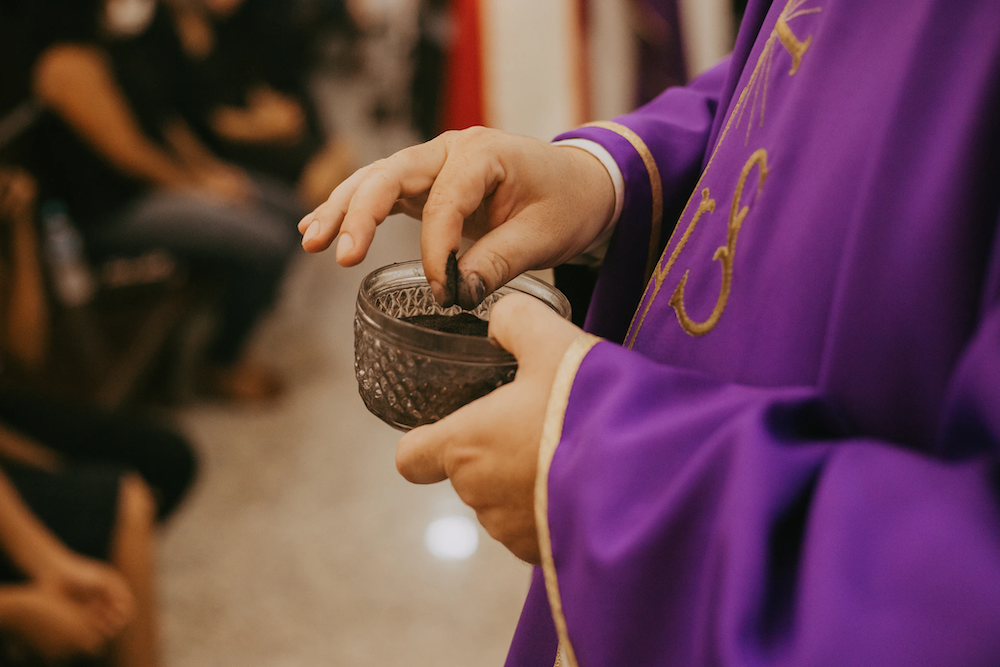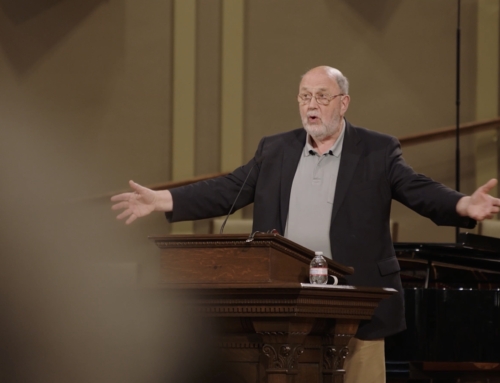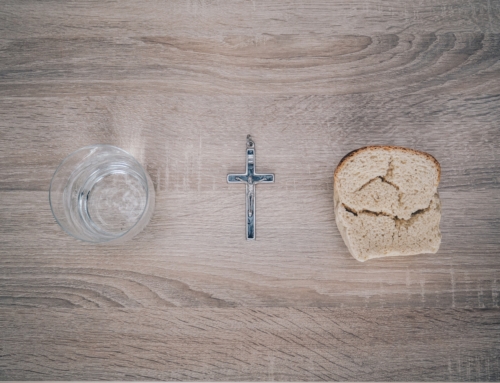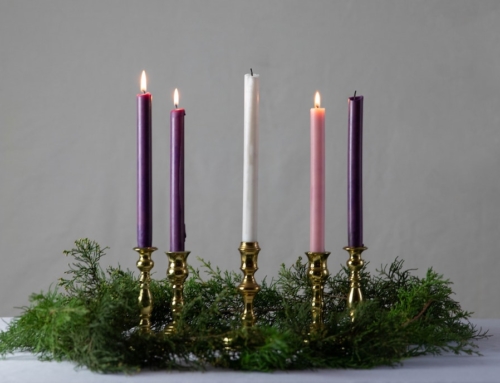Whether you’re used to the season of Lent or completely perplexed by its odd symbols and practices, we want to help show you why it can be a fruitful season of spiritual growth, whatever your background. We asked two of our N.T. Wright Online team members to share why Lent is important for them, one from a non-liturgical church context and one from a liturgical perspective.
Why I Need Lent: A Non-Liturgical Perspective by Jennifer Loop
Lent Undermines My Arrogant Assumptions
When I first became a follower of Jesus, I worshipped in a church that was wary of symbols or practices that seemed extra-biblical. We didn’t use set prayers or readings, nor did our worship follow a particular order. We certainly didn’t observe Lent (after all, the word ‘Lent’ isn’t in the Bible). The idea of giving up something for Lent seemed to us to signal “works-righteousness.” In defense of this view, I would refer to scriptures like Hosea 6:6 (“for I desire mercy, not sacrifice”) or Ephesians 2:9 (“not of works, so that no one can boast”).
As an outsider to liturgical life, Lent seemed like a strange season aimed at self-improvement. Sometimes, I wondered how Lent was different from a 40-day diet.
When I met my husband, I learned about his practice of fasting from meat on Fridays. On one of our first dates, he ordered beer-battered cod, as is typical for those who keep a Friday fast. I proudly ordered the chicken, touting my ‘freedom’ to eat what I wished and inwardly feeling superior to my (obviously weaker) husband. My attitude was not only immature; it was also arrogant.
Lent Renews My Faith
Here are some questions about Lent I’ve had to wrestle with over the years: Is Lent more than just a diet? If it is, and sacrificial practices are valuable, why not do it all the time? Is it really anything more than trying to hustle God into bestowing some prize? Or, worse, valorizing needless suffering as personal piety?
I don’t have solid answers to all of these questions. Yet, in the past few years, I’ve been introduced to Lent and experienced this season of liturgical life by periodically worshipping with friends in Anglican churches. I am learning that Christians are invited to join a particular rhythm of church life. This rhythm is more than routine for its own sake. It can be profoundly nurturing for our own lives of faith.
Dr. Esau McCaulley describes Lent as a season of recovery. In his course, A Journey Through Lent, he reminds us that Lent assumes we will mess up. All of us need to be reminded and encouraged toward repentance and renewal. Lent is uniquely positioned to accomplish this encouragement as we join the worldwide church to explore and embody these spiritual practices. Lent (and liturgical practices in general) connects us to others from various traditions and reorients my individualistic focus towards God and others.
Lent Lets Me Be Vulnerable
At one point during the course I mentioned above, students are prompted to repeatedly read a favorite psalm. My favorite verse in the Psalms is Psalm 147:3. “He heals the broken-hearted and binds up their wounds.” As I’ve been thinking through the themes of Lent, I have been considering how I might expose my woundedness to God. I’m not thinking of this as airing my laundry list of sins to check repentance off my list. Instead, it is laying bare the aspects of my broken-heartedness in need of God’s healing—my self-sufficiency, cynicism, selfishness, and the myriad ways I self-medicate my wounded heart. This reorients my earlier assumptions about fasting into a consideration of what my overwhelming desire for comfort might say about the wounds of my heart.
As someone relatively new to liturgical life, I’m hopeful this Lenten season will be a time of reflection that nourishes my life and faith. May Lent be a time that reinvigorates your own walk with Jesus.
Why I (Still) Need Lent: A Liturgical Perspective by Ryan Liguori
Lent Focuses My Spiritual Practice
In the 3rd and 4th centuries, around the time Christianity was becoming accepted into the wider culture, a group of devout men and women set off into the desert wilds of Egypt and surrounding areas. These desert mothers and fathers, as they came to be called, went to see if they really could live the simplicity that Jesus preached when he told his followers to sell all their possessions, abandon their families, and the like. After Christianity became the official religion of the state, and rampant persecution slowed, more and more of these spiritual explorers ventured out, this time to see if they could experience God absent the impetus of martyrdom or the new supports of imperial society.
Today, living in a country where, contrary to what you might hear from pundits, Christianity is still radically supported by the structures of the state, this ancient example is highly attractive. It is a refreshing challenge to my too-easy way of life. Those devout followers of Jesus set up an early form of Lenten observance, one in which they carved out the space necessary to discover exactly which disciplines would lead them to encounter the living God.
On the one hand, the season of Lent today provides a ready-made set of practices that I know will benefit my walk with Christ. It represents the collected wisdom of the universal church throughout the years as they’ve struggled with questions of how to better encounter Jesus in their everyday lives. On the other hand, Lent provides the space I need to discover which practices and habits I am most in need of.
Lent Slows Me Down
We need to face the fact that modern culture (religious and non-religious) values productivity, speed, and excess more than it values contemplation, simplicity, or quietude. As much as I try to resist these cultural pressures on my own, I know that without a clear program to follow I will get swept along.
Having practiced Lent in some form or another for many years now, I see how this season could become another example of the cultural pressure toward productivity. If I’m not careful, Lent can become little more than a 40-day challenge. When I was in college, that’s certainly what it became. Who can forego their mattress the longest without complaining? How much of the Bible could you read in 40 days? (Extra points for memorization. Extra EXTRA points for reading from the Greek!)
Well-intentioned at first, maybe, but when spiritual practices become a means of showing off our Christian bonafides, we’ve simply adopted the world’s value system.
The values of speed, excess, and productivity may be good for capitalism, but they’re bad for spirituality. They make me greedy, self-centered, impatient, and anxious. Lent undercuts this. It says slow down, and it says it in big, bold, screaming letters.
SLOW DOWN.
Through stark symbols like the ashes, liturgical disruptions like the sudden disappearance of “Hallelujah” from the mass, and the shocking darkness of the whole season, Lent reminds me that no amount of productivity can stave off death, nor can I race my way around my sins like a car blowing through a swiftly changing traffic light.
Lent says walk in a culture that screams run.
Slow down. Pause. Remember the basics.
Lent Leads Me Into New Possibility
After your first few years of keeping Lent, you run up against the inevitable question: What’s the point? It’s not a bad question. I believe it’s a question everybody should ask, all the time, of everything they do, including following Jesus.
While still resisting the temptation to measure spiritual practices by worldly standards, we – I (I’ll speak for myself) – need to answer this question, lest I succumb to the sorrow inherent in Lenten worship. The novelty of liturgy wears off quickly. It is meant to. These words, the same and the same and the same, for hundreds of years, signal reassurance; trustworthiness. It is precisely this unrelenting sameness that opens up space for new works of God’s spirit in individual lives.
In N.T. Wright’s Luke edition of Lent for Everyone, he uses the metaphor of a house that’s grown dusty and disorganized through lack of attention. Our spiritual lives can easily become like this. At least mine can. Those cobwebs in the corner, I’ll take care of them when I’m not so tired or distracted. (When is that?)
Wright uses this metaphor to say that Lent is a time set aside for the purposes of “cleaning house,” as it were. Sweep up the cobwebs. But even moreso, once the house is clean, we’re given the chance to reevaluate whether that is actually the best place for the couch, whether the TV might make more sense in a different corner. “When God forgives,” he writes, “God does so not in order to bring us back from being ‘in the red’ merely to having a ‘zero’ balance. God does so in order to guide us into new tasks and callings he’s had in mind for us all along, but for which we weren’t ready.” Our focus on repentance and forgiveness at Lent, our “cleaning house,” ultimately serves the purpose of calling us into new possibility.
May you discover new possibility as you reflect with God this Lent.
Jennifer Loop
Latest posts by Jennifer Loop (see all)
- Why You Need Lent: Two Perspectives - February 22, 2023
- How (Not) To Understand a Parable - October 20, 2022
- What People are Saying About ‘Ethnicity, Justice and the People of God’ - February 10, 2022







